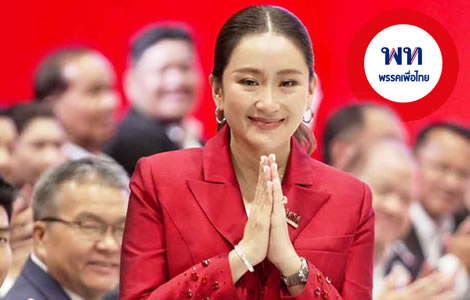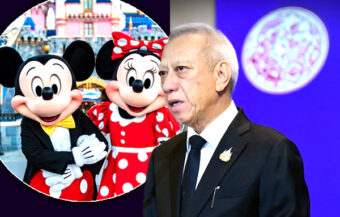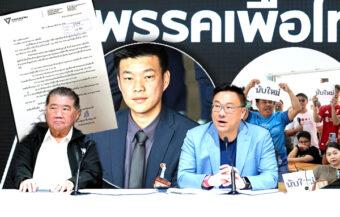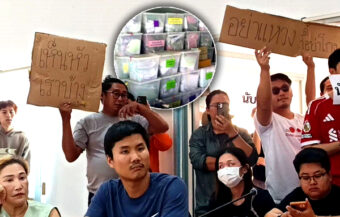Pheu Thai rises as support for the People’s Party falls over its shock backing of Anutin as PM, while Thaksin is jailed, Bhumjaithai rises rapidly, and the 2026 election promises a fierce, unpredictable battle over Thailand’s government and democratic future.
With the People’s Party showing cracks in public support and a resurgent Bhumjaithai rising as Thailand’s conservative standard-bearer, Pheu Thai’s role has taken on new urgency. Thaksin Shinawatra’s jailing at Khlong Prem Prison, coupled with the People’s Party backing Anutin Charnvirakul as Prime Minister, has shaken the progressive camp. Support from Pheu Thai’s base is rising, as the party reorganises fast to confront the 2026 election. Next year’s contest will be a titanic struggle—not just for government. It will be fought over the 2017 Constitution and the country’s democratic future.

Thailand is preparing for a general election next year, which promises a fierce and unpredictable political battle. Moreover, analysts warn that the race is already shaping up as a clash of three major parties, each vying for power in its own right. This contest could redefine political alliances and influence governance for years to come.
Contrary to recent speculation, reports of the Pheu Thai Party’s demise appear highly exaggerated. While some suggest the party is weakened, its leadership remains focused on a strategic comeback. Meanwhile, Prime Minister Anutin Charnvirakul, who leads the Bhumjaithai Party, has been actively courting defectors and new MPs. Consequently, his party has strengthened its parliamentary presence and positioned itself as a key political player.
Simultaneously, former Prime Minister Paetongtarn Shinawatra is preparing Pheu Thai for a renewed electoral fight. Her father, Thaksin Shinawatra, currently serving time at Khlong Prem Prison, remains a symbolic figure for the party. In addition, the party has undertaken structural reforms to enhance internal cohesion, transparency and grassroots engagement.
Pheu Thai consolidates leadership and strengthens internal structure ahead of a critical general election
Recent polling data highlights the fluidity of Thailand’s political landscape. The National Institute of Development Administration (NIDA) conducted a survey in late September, revealing dramatic shifts in public opinion. Specifically, support for the People’s Party dropped from 46.08% in June to 33.08%. Conversely, Pheu Thai’s support increased slightly from 11.52% to 13.96%, and undecided voters surged to 21.64%. Consequently, analysts caution that the election remains highly unpredictable.
Historically, about 65% of voters have favoured a pro-democratic alliance consisting of Pheu Thai, the People’s Party, and smaller parties such as Thai Sang Thai. However, Thai Sang Thai has proven unpredictable in parliamentary votes, complicating potential coalition negotiations. Furthermore, many voters who prioritise democratic freedoms expressed disappointment when the People’s Party supported Anutin Charnvirakul as Prime Minister in early September.
This dissatisfaction intensified after People’s Party leader Nattapong Ruangpanyawut offered tacit support to the interim government. Despite criticism from party firebrands Rangsiman Rome and Wiroj Lakkhanaadisorn, Nattapong maintained a quiet alignment, which some analysts say undermines party unity. As a result, the People’s Party faces internal and public pressure simultaneously.
Polls reveal shifting voter support and rising challenges for the People’s Party in upcoming election contests
Meanwhile, Pheu Thai has actively reasserted its influence. The Red Shirt movement has reemerged following Thaksin’s voluntary return to Thailand on September 8 from Dubai. The next day, he was jailed as a regular inmate at Khlong Prem Prison, signalling a dramatic and highly publicised chapter in Thai politics. Consequently, his presence, even in incarceration, remains a powerful mobilising force for party supporters.
In addition, the party is working to consolidate loyalty among key figures while Thaksin remains imprisoned. Paetongtarn Shinawatra, acting as both de facto leader and spiritual figurehead, is central to this effort. Her leadership strengthens campaign organisation, voter outreach, and policy planning. Analysts note that her active engagement ensures the party maintains its historical identity while adapting to contemporary political challenges.
However, uncertainty looms over Thaksin’s legal status. It is not yet clear whether he will be granted a pardon or parole before the 2026 general election. Nonetheless, his symbolic influence is expected to shape political discourse, affect voter sentiment, and influence coalition negotiations. Therefore, Pheu Thai’s campaign strategy must account for this uncertainty while leveraging its continued political weight.
Thaksin’s return and incarceration galvanise Pheu Thai as leadership consolidates ahead of the election
Suriya Jungrungreangkit, recently appointed as Pheu Thai’s election director, expressed confidence that the party could win at least 200 parliamentary seats. Speaking at the party’s event, “Reinventing Pheu Thai, Reinventing Thailand,” Suriya unveiled 193 candidates nationwide. Moreover, he emphasised the party’s readiness to compete vigorously across all regions.
Suriya, a former deputy prime minister and transport minister, cited the decline of People’s Party support as a key advantage. Social media engagement for the People’s Party has plunged from around 80,000 likes per post to under 10,000. Consequently, Pheu Thai’s candidates are now directly positioned to challenge the People’s Party’s incumbents, potentially capturing critical districts.
The Bhumjaithai Party, despite winning only 3% of the 2023 party-list vote, has rapidly expanded its base. Analysts estimate its support now ranges from 13% to 14%, strengthened by defections and strategic alliances. Importantly, the party maintains strong networks in key constituencies and enjoys backing from Thailand’s influential “Big Houses.” As a result, it has become a prominent conservative voice in national politics.
Suriya and Pheu Thai focus on nationwide candidate rollout as Bhumjaithai consolidates conservative power
Paetongtarn Shinawatra addressed party members at the headquarters, highlighting recent challenges. She reflected on Thaksin’s imprisonment, recent by-election setbacks, and public perceptions questioning Pheu Thai’s relevance. “Every hardship teaches us to rise stronger,” she said. She added that current challenges would enable the party to regain its former dominance during the Thai Rak Thai era.
She also stressed that the party would reveal its three prime ministerial candidates at the appropriate time. Importantly, she clarified that these candidates are independent and not related to her family.
Paetongtarn emphasised that reforms to party structure aim to promote unity, transparency, and meaningful grassroots participation. Additionally, initiatives such as the Young Pheu Thai Platform and Moonshot Forum encourage input from youth and experts to shape party policy.
Anusorn Iamsaard, Pheu Thai party-list MP, reinforced the party’s resilience in recent interviews. He dismissed claims that the party faces a crisis and highlighted its historical ability to overcome setbacks, tracing its roots back to Thai Rak Thai and the People’s Power Party. He stressed that enduring policies, such as the ฿30 universal healthcare scheme and the SML village fund, remain central to the party’s platform.
Paetongtarn and Anusorn highlight resilience and party reforms to rebuild trust and historical influence
Furthermore, Anusorn stressed that Pheu Thai must act as a strong opposition over the next four months. He noted that scrutinising government actions, communicating policies, and engaging voters will strengthen public trust. “Being in government or opposition is not new for Pheu Thai,” he said. “We can act intensively wherever we are.” He also expressed confidence in Paetongtarn’s leadership to guide the party’s resurgence.
Polling data underlines the complex dynamics of voter sentiment. The NIDA survey conducted from September 19 to 24 found that 27.28% of respondents remain undecided about their choice of prime minister. Among decided voters, People’s Party leader Nattapong Ruangpanyawut led with 22.80%, followed closely by Prime Minister Anutin at 20.44%. Thai Sang Thai leader Khunying Sudarat Keyuraphan received 7.16%, Pheu Thai’s Chaikasem Nitisiri 6.76%, and former Prime Minister Gen Prayut Chan-o-cha 6.00%.
Party preferences reveal a similarly fragmented landscape. The People’s Party leads with 33.08% support, while undecided voters account for 21.64%. Pheu Thai follows with 13.96%, Bhumjaithai at 13.24%, United Thai Nation Party at 6.12%, and the Democrat Party at 5.52%. Analysts argue that the high number of undecided voters could be decisive in several key constituencies.
Voter indecision rises and party support fragments ahead of a potentially decisive 2026 general election
Observers emphasise that Thailand’s next election will test the ability of parties to maintain cohesion and voter trust. Pheu Thai benefits from a historically loyal base and resilient party structures. Bhumjaithai’s rise demonstrates the value of strategic alliances and constituency-level influence. Meanwhile, the People’s Party faces the challenge of internal divisions amid declining popularity.
Nevertheless, it still leads in the polls, even though its voter base is more sympathetic to working with Pheu Thai. Certainly, Pheu Thai’s growth comes with a return of voters who lost faith in June over Paetongtarn’s disastrous telephone call with Hun Sen. Similarly, there is a return of some who previously condemned its 2023 decision to form a government with parties associated with General Prayut Chan-o-cha.
However, recent events have not reversed the decision by Nattapong Ruangpanyawut and the People’s Party leadership to support Anutin Charnvirakul of the Bhumjaithai Party as Prime Minister in early September.
Indeed, the decline of the People’s Party and a polarised electorate surging between Red and Blue factions appears likely at this time. Of course, this may produce a three-way contest. Certainly, the electorate perceives the Orange and Red parties as supporters of democratic reform in Thailand.
Election stakes heighten as electorate polarisation and party fragility set up a complex three-way contest
The political environment is both volatile and competitive. Each party is pursuing aggressive strategies, from candidate selection to grassroots mobilisation. Pheu Thai leverages its historic policies and influential figures, while Bhumjaithai consolidates conservative support. Meanwhile, the People’s Party must hold on to its base amid public scepticism at its tacit support for Prime Minister Anutin Charnvirakul and the interim government.
Ultimately, the 2026 general election is shaping up as a titanic struggle for power. Undecided voters, internal party cohesion, and coalition-building will determine the outcome. Despite uncertainty, one factor is clear: Thailand’s three major parties will be engaged in a political contest to decide the future of the kingdom and its politics.
Out of it will come the next government, but those on the pro-democracy side are hoping to win a mandate for a new constitution. The 2017 Constitution is widely seen as the reason for Thailand’s chronic political instability since 2023. On the other hand, the emerging conservative bloc led by the Bhumjaithai Party has shown a marked reluctance to alter or change the 2017 charter.
Pro-democracy forces seek a mandate for constitutional reform amid rising conservative opposition
Indeed, the Bhumjaithai Party is also linked to the Senate closure scandal, which is presently being investigated by the Department of Special Investigation (DSI) and the Election Commission. This issue, either way, has the potential to make its presence felt on the electorate.
On one hand, if the Bhumjaithai Party leadership is prosecuted, or on the other hand, if the Bhumjaithai-controlled Senate succeeds in appointing its nominees to the Election Commission, Constitutional Court, and National Anti-Corruption Commission (NACC), that will effectively be a slow coup d’état achieved through influence networking.
The voting electorate, in the meantime, has consistently shown a decisive majority seeking democratic governance. The country has also learned that this is linked to economic performance. Most analysts now confirm Thailand’s lagging economic growth over the last two decades is a result of political instability.
Senate election scandal and legal battles could impact voter sentiment and democratic stability
Finally, Thailand enters the next general election amid unprecedented political energy. Pheu Thai is seeking to reclaim historical influence, Bhumjaithai is asserting conservative power, and the People’s Party has been left facing a crisis of faith among its voter base.
With undecided voters playing a central role, the election promises to be a decisive test of leadership, strategy, and public trust. Consequently, political observers anticipate intense competition, shifting alliances, and high voter engagement in the coming months.
Chuwit raises the alarm over a ‘working group’ into sensitive cases set up by the new Justice Minister
PM confirms government’s referendum plan to scrap MOUs with Cambodia. Top People’s Party MP shocked
Former PM Thaksin transferred within hours to the notorious Khlong Prem Prison or the ‘Bangkok Hilton’
The 2026 election will ultimately revolve around the 2017 Constitution. Meanwhile, the Bhumjaithai Party is expected to play on nationalist sentiment. There are real fears that both the People’s Party and Pheu Thai may fail to manage and coalesce as they need to, in order to implement real democratic change in Thailand.
Join the Thai News forum, follow Thai Examiner on Facebook here
Receive all our stories as they come out on Telegram here
Follow Thai Examiner here
Further reading:
Election Commission moves forward steadily with Election Collusion case linked to Bhumjaithai Party
Bombshell news as Bhumjaithai Party leadership is summoned by Election Commission over Senate poll


















